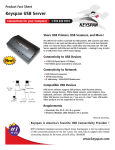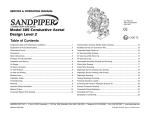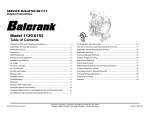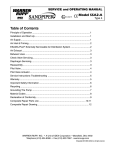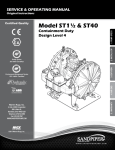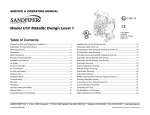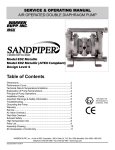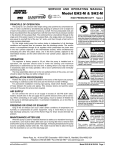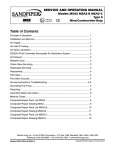Download G05 Operations Manual
Transcript
SERVICE & OPERATING MANUAL II 2GD T5 Model G05 Metallic Design Level 1 Natural Gas-Operated Diaphragm Pumps U.S. Patent # 5,996,627; 6,241,487 Other U.S. Patents Applied for Table of Contents Engineering Data and Temperature Limitations..................................................... 1 Available Service and Conversion Kits................................................................. 12 Performance Curve................................................................................................ 2 Composite Repair Parts List................................................................................. 13 Dimensions (Aluminum Model) ............................................................................. 3 Natural Gas Distribution Valve Assembly Drawing and Parts List........................ 14 Metric Dimensions (Aluminum Model) . ................................................................. 4 Natural Gas Distribution Valve Servicing.............................................................. 15 Dimensions (Stainless Steel Model) . .................................................................... 5 Pilot Valve Servicing, Assembly Drawing & Parts List.......................................... 16 Metric Dimensions (Stainless Steel Model) ........................................................... 6 Diaphragm Service Drawing, with Overlay........................................................... 17 Principle of Pump Operation.................................................................................. 7 Diaphragm Service Drawing, Non-Overlay.......................................................... 17 Installation and Start-Up......................................................................................... 7 Diaphragm Servicing............................................................................................ 18 Natural Gas Supply................................................................................................ 7 Overlay Diaphragm Servicing . ............................................................................ 19 Natural Gas Valve Lubrication................................................................................ 7 Actuator Plunger Servicing................................................................................... 19 Natural Gas Line Moisture...................................................................................... 7 Check Valve Servicing.......................................................................................... 20 Natural Gas Inlet and Priming................................................................................ 7 Check Valve Drawing........................................................................................... 20 Between Uses........................................................................................................ 7 Provision for Piping Gas Exhaust......................................................................... 21 Installation Guide.................................................................................................... 8 Pumping Hazardous Liquids................................................................................ 21 Troubleshooting...................................................................................................... 9 Piping Exhaust Natural Gas................................................................................. 21 Warranty................................................................................................................. 9 Exhaust Illustration............................................................................................... 21 Recycling.............................................................................................................. 10 Grounding The Pump........................................................................................... 22 Important Safety Information................................................................................ 10 ATEX Declaration of Conformity........................................................................... 23 Material Codes..................................................................................................... 11 CE Declaration of Conformity............................................................................... 24 Composite Repair Parts Drawing......................................................................... 12 BRUIN INSTRUMENT CORPORATION • Edmonton, Alberta • Phone (780) 430-1777 II 2GD T5 Quality System ISO9001 Certified Environmental Management System ISO14001 Certified INTAKE/DISCHARGE PIPE SIZE ½" NPT or ½" BSP Tapered (internal) ½" NPT or ½" BSP Tapered (external) U.S. Patent # 5,996,627; 6,241,487 Other U.S. Patents Applied for CAPACITY 0 to 15 gallons per minute (0 to 56 liters per minute) GAS VALVE No-lube, no-stall design SOLIDS-HANDLING Up to .125 in. (3mm) CAUTION! Operating temperature limitations are as follows: Materials G05 Metallic Natural Gas-Operated Diaphragm Pumps ENGINEERING, PERFORMANCE & CONSTRUCTION DATA HEADS UP TO 100 psi or 230.7 ft. of water (7 Kg/cm2 70 meters) DISPLACEMENT/STROKE .026 Gallon / .098 liter Operating Temperatures Maximum Minimum Nitrile: General purpose, oil-resistant. Shows good solvent, oil, water and hydraulic fluid resistance. Should not be used with highly polar solvents like acetone and MEK, ozone, chlorinated hydrocarbons and nitro hydrocarbons. 190°F 88°C -10°F -23°C Virgin PTFE: Chemically inert, virtually impervious. Very few chemicals are known to react chemically with PTFE: molten alkali metals, turbulent liquid or gaseous fluorine and a few fluoro-chemicals such as chlorine trifluoride or oxygen difluoride which readily liberate free fluorine at elevated temperatures. 220°F 104°C -35°F -37°C FKM (Fluorocarbon): Excellent resistance to sour natural gas, high temperatures, acids, hydrogen sulfide, and oils. 400°F 204°C -15°F -26°C For specific applications, always consult “Chemical Resistance Chart” Technical Bulletin These G05 models are designed to be powered by natural gas. The minimum pump operating temperature is -10°F. The maximum operating temperature is 180°F. Bruin(G05)-REV0408 Model G05 Metallic Page 1 Performance Curve, G05 Model Metallic Design Level 1 MODEL G05 Metallic Performance Curve BAR PSI Performance based on the following: elastomer fitted pump, flooded suction, water at ambient conditions. The use of other materials and varying hydraulic conditions may result in deviations in excess of 5%. 7 100 2 (3.5) 4 (7) 6 (10) 8 (13.5) 100 P SI (6.8 Bar) 10 (17) 12 (20) 6 (5.44 B 16 (27) ar) HEAD 18 (30) 4 3 60 60 PSI 40 40 PS (4.08 B ar) I (2.72 2 20 20 PSI 1 0 0 0 0 20 (33.75) Bar) (1.36 B ar) Gas Inlet Pre ssure 4 2 10 6 8 10 U.S. Gallons per minute 20 30 Liters per minute 40 12 14 50 METERS 5 FEET 80 PSI NPSHR 14 (24) 80 30 25 20 15 10 5 9.1 7.6 6 4.5 3 1.5 16 60 CAPACITY Bruin(G05)-REV0408 Model G05 Metallic Page 2 Dimensions: G05 Metallic (Aluminum Model) Dimensions in Inches Dimensional Tolerance: ±1/8" Discharge Port 1/2" NPT (Internal) 1" NPT (External) 3/8" NPT For Piping Exhausted Natural Gas Gas Inlet 1/4" NPT Suction Port 1/2" NPT (Internal) 1" NPT (External) Both Suction And Discharge Ports Are Available In 1/2" BSPT (Tapered Internal) 1" BSPT (Tapered External) Note: The pump is to be mounted in a horizontal position Bruin(G05)-REV0408 Model G05 Metallic Page 3 Metric Dimensions: G05 Metallic (Aluminum Model) Dimensions in Millimeters Dimensional Tolerance: ± 3mm Discharge Port 1/2" NPT (Internal) 1" NPT (External) 3/8" NPT For Piping Exhausted Natural Gas Gas Inlet 1/4" NPT Suction Port 1/2" NPT (Internal) 1" NPT (External) Both Suction and Discharge Ports Are Available In 1/2" BSPT (Tapered Internal) 1" BSPT (Tapered External) Note: The pump is to be mounted in a horizontal position Bruin(G05)-REV0408 Model G05 Metallic Page 4 Dimensions: G05 Metallic (Stainless Steel Model) Dimensions in Inches Dimensional Tolerance: ±1/8" Discharge Port 1/2" NPT (Internal) 1" NPT (External) 3/8" NPT Port For Piping Exhausted Natural Gas. Gas Inlet 1/4" NPT Suction Port 1/2" NPT (Internal) 1" NPT (External) Both Suction And Discharge Ports Are Available In 1/2" BSPT Tapered (Internal) 1" BSPT Tapered (External) Note: The pump is to be mounted in a horizontal position Bruin(G05)-REV0408 Model G05 Metallic Page 5 Metric Dimensions: G05 Metallic (Stainless Steel Model) Dimensions in Millimeters Dimensional Tolerance: ± 3mm Discharge Port 1/2" NPT (Internal) 1" NPT (External) 3/8" NPT Port For Piping Exhausted Natural Gas Gas Inlet 1/4" NPT Suction Port 1/2" NPT (Internal) 1" NPT (External) Both Suction And Discharge Ports Are Available In 1/2" BSPT Tapered (Internal) 1" BSPT Tapered (External) Note: The pump is to be mounted in a horizontal position Bruin(G05)-REV0408 Model G05 Metallic Page 6 PRINCIPLE OF PUMP OPERATION This ball type check valve pump is powered by sweet natural gas and is a 1:1 ratio design. The inner side of one diaphragm chamber is alternately pressurized while simultaneously exhausting the other inner chamber. This causes the diaphragms, which are connected by a common rod secured by plates to the centers of the diaphragms, to move in a reciprocating action. (As one diaphragm performs the discharge stroke the other diaphragm is pulled to perform the suction stroke in the opposite chamber.) Gas pressure is applied over the entire inner surface of the diaphragm while liquid is discharged from the opposite side of the diaphragm. The diaphragm operates in a balanced condition during the discharge stroke which allows the pump to be operated at discharge heads over 200 feet (61 meters) of water. For maximum diaphragm life, keep the pump as close to the liquid being pumped as possible. Positive suction head in excess of 10 feet of liquid (3.048 meters) may require a back pressure regulating device to maximize diaphragm life. Alternate pressurizing and exhausting of the diaphragm chamber is performed by an externally mounted, pilot operated, four way spool type gas distribution valve. When the spool shifts to one end of the valve body, inlet pressure is applied to one diaphragm chamber and the other diaphragm chamber exhausts. When the spool shifts to the opposite end of the valve Bruin(G05)-REV0408 body, the pressure to the chambers is reversed. The gas distribution valve spool is moved by a internal pilot valve which alternately pressurizes one end of the valve while exhausting the other end. The pilot valve is shifted at each end of the diaphragm stroke when a actuator plunger is contacted by the diaphragm plate. This actuator plunger then pushes the end of the pilot valve spool into position to activate the gas distribution valve. The chambers are connected with manifolds with a suction and discharge check valve for each chamber, maintaining flow in one direction through the pump. INSTALLATION AND START-UP Locate the pump as close to the product being pumped as possible. Keep the suction line length and number of fittings to a minimum. Do not reduce the suction line diameter. For installations of rigid piping, short sections of flexible conductive hose should be installed between the pump and the piping. The flexible conductive hose reduces vibration and strain to the pumping system. A surge suppressor is recommended to further reduce pulsation in flow. NATURAL GAS SUPPLY Natural gas inlet pressure must be regulated to 100 (7 bar) psi with a pressure regulator. Connect the pump gas inlet to an gas supply of sufficient capacity and pressure required for desired performance. When the gas supply line is solid piping, use a short length of flexible conductive hose not less than 3/4" (19mm) in diameter between the pump and the piping to reduce strain to the piping. The weight of the gas supply line, regulators and filters must be supported by some means other than the gas inlet cap. Failure to provide support for the piping may result in damage to the pump. A pressure regulating valve should be installed to insure gas supply pressure does not exceed recommended limits. VALVE LUBRICATION The natural gas distribution valve and the pilot valve are designed to operate WITHOUT lubrication. This is the preferred mode of operation. There may be instances of personal preference or poor quality gas supplies when lubrication of the supply is required. The pump system will operate with properly lubricated supply. Proper lubrication requires the use of an gas line lubricator set to deliver one drop of SAE 10 nondetergent oil for every 20 SCFM (9.4 liters/sec.) of gas the pump consumes at the point of operation. Consult the pump’s published Performance Curve to determine this. GAS INLET AND PRIMING To start the pump, open the gas valve approximately 1/2" to 3/4" turn. After the pump primes, the valve can be opened to increase gas flow as desired. If opening the valve increases cycling rate, but does not increase the rate of flow, cavitation has occurred. The valve should be closed slightly to obtain the most efficient gas flow to pump flow ratio. BETWEEN USES When the pump is used for materials that tend to settle out or solidify when not in motion, the pump should be flushed after each use to prevent damage. (Product remaining in the pump between uses could dry out or settle out. This could cause problems with the diaphragms and check valves at restart.) In freezing temperatures the pump must be completely drained between uses in all cases. WARNING Natural gas exhaust is to be vented to low pressure safe location using conductive Nitrile rubber hose or metal piping in accordance with local fire and environmental codes, or an industry or nationally recognized code having jurisdiction over specific installations, and/or CAN/CGA B149, Installation Codes. Model G05 Metallic Page 7 INSTALLATION GUIDE 1 Top Discharge Ball Valve Pump 2 020.062.000. Filter VENTING WARNING: This filter is equipped with a stainless steel manual drain. The port is 1/8" NPT. When draining moisture from the filter, first shut off the natural gas supply. 020.057.000. REGULATOR WITH GAGE PRESSURE WARNING: This regulator is to be installed at point of use with the pump. The maximum gas supply is 250psi. Full line pressure needs to be regulated below 250psi prior to the regulator installation position. VENTING WARNING: This regulator is equipped with a 1/4" NPT vent port. In the event of a diaphragm rupture, natural gas can be exhausted into the surrounding environment. Connect a conductive hose or pipe to the vent port to send the escaping natural gas to a safe area for gas reclamation. Make sure to ground the regulator, hose, and/or pipe. CAUTION The natural gas exhaust must be piped to an area for safe disposition of the product being pumped, in the event of a diaphragm failure. Flexible Conductive Connection Natural Gas Exhaust Gas Shut-Off Valve Regulator w/Gauge Filter Natural gas supply conductive piping must be supported Natural Gas Inlet 1 2 The pump must be rigidly mounted in the horizontal position with fasteners to a conductive base or natural ground. Bruin(G05)-REV0408 Model G05 Metallic Page 8 TROUBLESHOOTING Possible Symptoms: • Pump will not cycle. • Pump cycles, but produces no flow. • Pump cycles, but flow rate is unsatisfactory. • Pump cycle seems unbalanced. • Pump cycle seems to produce excessive vibration. What to Check: Excessive suction lift in system. Corrective Action: For lifts exceeding 20 feet (6 meters), filling the pumping chambers with liquid will prime the pump in most cases. What to Check: Excessive flooded suction in system. Corrective Action: For flooded conditions exceeding 10 feet (3 meters) of liquid, install a back pressure device. What to Check: System head exceeds natural gas supply pressure. Corrective Action: Increase the inlet gas pressure to the pump. Most diaphragm pumps are designed for 1:1 pressure ratio at zero flow. What to Check: Natural gas supply pressure or volume exceeds system head. Corrective Action: Decrease inlet gas pressure and volume to the pump as calculated on the published PERFORMANCE CURVE. Pump is cavitating the fluid by fast cycling. Bruin(G05)-REV0408 What to Check: Undersized suction line. Corrective Action: Meet or exceed pump connection recommendations shown on the DIMENSIONAL DRAWING. What to Check: Restricted or undersized gas line. Corrective Action: Install a larger gas line and connection. Refer to gas inlet recommendations shown in your pump’s SERVICE MANUAL. What to Check: Check the externally serviceable gas distribution system of the pump. Corrective Action: Disassemble and inspect the natural gas distribution valve, pilot valve and pilot valve actuators. Refer to the parts drawing and valve section of the SERVICE MANUAL. Check for clogged discharge or closed valve before reassembly. What to Check: Pumped fluid in gas exhaust line. Corrective Action: Disassemble pump chambers. Inspect for diaphragm rupture or loose diaphragm plate assembly. Refer to the Diaphragm Replacement section of your pump SERVICE MANUAL. What to Check: Fluid suction side air leakage or air in product. Corrective Action: Visually inspect all suction side gaskets and pipe connections. What to Check: Obstructed check valve. Corrective Action: Disassemble the wet end of the pump and manually dislodge obstruction in the check valve pocket. Refer to the Check Valve section of the pump SERVICE MANUAL for disassembly instructions. What to Check: Worn or misaligned check valve or check valve seat. Corrective Action: Inspect check valves and seats for wear and proper seating. Replace if necessary. Refer to Check Valve section of the pump SERVICE MANUAL for disassembly instructions. What to Check: Entrained air or vapor lock in one or both fluid pumping chambers. Corrective Action: Purge chambers through tapped chamber vent plugs. PURGING THE CHAMBERS OF AIR CAN BE DANGEROUS! Contact your Technical Services Group before performing this procedure. Any model with top-ported discharge will reduce or eliminate problems with entrained air. If your pump continues to perform below your expectations, contact your local Distributor or factory Technical Services Group for a service evaluation. What to Check: Blocked suction line. Corrective Action: Remove or flush obstruction. Check and clear all suction screens and strainers. What to Check: Blocked discharge line. Corrective Action: Check for obstruction or closed discharge line valves. What to Check: Blocked pumping chamber. Corrective Action: Disassemble and inspect the wetted chambers of the pump. Remove or flush any obstructions. Refer to the pump SERVICE MANUAL for disassembly instructions. Model G05 Metallic Page 9 RECYCLING Many components of Natural Gas Operated Metallic pumps are made of recyclable materials (see chart on page 10 for material specifications). We encourage pump users to recycle worn out parts and pumps whenever possible, after any hazardous pumped fluids are thoroughly flushed. WARNING Do not smoke near the pump or use the pump near an open flame. Fire or explosion could result. WARNING This pump must not be used for fluid transfer into aircraft. IMPORTANT SAFETY INFORMATION IMPORTANT Read these safety warnings and instructions in this manual completely, before installation and start-up of the pump. It is the responsibility of the purchaser to retain this manual for reference. Failure to comply with the recommendations stated in this manual will damage the pump, and void factory warranty. CAUTION Before pump operation, inspect all gasketed fasteners for looseness caused by gasket creep. Retorque loose fasteners to prevent leakage. Follow recommended torques stated in this manual. WARNING Certified to CSA Technical Letter No. R-14 Before maintenance or repair, shut off the compressed natural gas line, bleed the pressure, and disconnect the gas line from the pump. The discharge line may be pressurized and must be bled of its pressure. Certified to CSA Requirement 2.01 US II 2GD T5 Bruin(G05)-REV0408 Pump complies with EN809 Pumping Directive, Directive 98/37/EC Safety of Machinery, and Directive 94/9/EC, EN13463-1 Equipment for use in Potentially Explosive Environments. The Technical File No. AX1 is stored at KEMA, Notified Body 0344, under Document #203040000. WARNING In the event of diaphragm rupture, pumped material may enter the natural gas end of the pump, and be discharged into the atmosphere. The gas exhaust must be piped to an appropriate area for safe disposition. WARNING Take action to prevent static sparking. Fire or explosion can result, especially when handling flammable liquids. The pump, piping, valves, containers or other miscellaneous equipment must be grounded. WARNING This pump is pressurized internally with natural gas pressure during operation. Always make certain that all bolting is in good condition and that all of the correct bolting is reinstalled during assembly. WARNING When used for toxic or aggressive fluids, the pump should always be flushed clean prior to disassembly. WARNING Before doing any maintenance on the pump, be certain all pressure is completely vented from the pump, suction, discharge, piping, and all other openings and connections. Be certain the natural gas supply is locked out or made non‑operational, so that it cannot be started while work is being done on the pump. Be certain that approved eye protection and protective clothing are worn all times in the vicinity of the pump. Failure to follow these recommendations may result in serious injury or death. WARNING Airborne particles and loud noise hazards. Wear ear and eye protection. Model G05 Metallic Page 10 Exxon Mobile Corp. Bruin(G05)-REV0408 Model G05 Metallic Page 11 Composite Repair Parts Drawing Available Service Kits: 476.237.000 Gas End Kit Seals, O-Rings, Gaskets, Bumpers, Retaining Rings, Valve Assembly and Pilot Valve Assembly 476.237.363 Gas End Kit FKM Seals, O-Rings, Gaskets, Bumpers, Retaining Rings, Valve Assembly and Pilot Valve Assembly 476.238.360 Wetted End Kit Nitrile Diaphragms, Nitrile Check Balls and PTFE Seats 476.238.649 Wetted End Kit Nitrile Diaphragm, PTFE Overlay Diaphragm, PTFE Check Balls and PTFE Seats 476.238.672 Wetted End Kit Nitrile Diaphragms, PTFE Check Balls, PTFE Seats Bruin(G05)-REV0408 Model G05 Metallic Page 12 Composite Repair Parts List ITEM 1 PART NUMBER 031-174-000 031-174-363 2 050-022-600 050-027-360 3 095-116-000 095-116-363 4 114-023-157 5 115-152-151 6 132-034-360 132-034-363 7 135-036-506 8 165-110-157 9 171-017-330 10 170-044-330 11 170-045-330 170-045-330 12 171-076-330 13 171-077-330 14 196-171-110 196-171-157 15 286-095-360 16 286-096-600 17 312-110-157 18 312-111-157 19 360-100-379 20 360-108-360 21 360-102-360 Bruin(G05)-REV0408 DESCRIPTION Gas Valve Assembly Gas Valve Assembly Ball, Check Ball, Check Pilot Valve Assembly Pilot Valve Assembly Intermediate Bracket Bracket, Mounting (Aluminum) Bumper, Diaphragm Bumper, Diaphragm Bushing, Plunger Cap, Gas Inlet Capscrew, Flat Socket Head 1/4-20 X .50 (Aluminum) Capscrew, Hex 5/16-18 X 1.00 Capscrew, Hex 5/16-18 X 1.25 (Alum) Capscrew, Hex 5/16-18 X 1.25 (SS) Capscrew, Flanged 1/4-20 X .75 Capscrew, Flanged 1/4-20 X 1.50 Chamber, Outer Chamber, Outer Diaphragm Diaphragm, Overlay Elbow, Suction (Aluminum Only) Elbow, Discharge (Aluminum Only) Gasket, Gas Inlet Gasket, Pilot Valve Gasket, Gas Valve QTY 1 1 4 4 1 1 1 2 2 2 2 1 4 8 40 24 4 4 2 2 2 2 2 2 1 1 1 ITEM 22 23 24 25 26 27 28 29 30 31 32 33 34 35 36 PART NUMBER 518-157-157 518-157-157E 518-158-110 518-158-110E 518-159-110 518-159-110E 545-004-330 545-004-330 560-001-360 560-001-363 560-083-360 560-083-360 560-083-611 720-064-600 612-091-110 612-091-157 612-177-330 620-019-115 675-042-115 685-056-110 720-012-360 720-012-363 722-094-600 722-094-150 722-094-110 920-025-000 900-004-330 900-004-330 DESCRIPTION Manifold (see item 29) (Aluminum Only) Manifold BSP (Tapered) (Alum Only) Manifold, Suction (SS) Manifold, Suction BSP (Tapered) (SS) Manifold, Discharge (SS) Manifold, Discharge BSP (Tapered) (SS) Nut, Hex Flanged 5/16-18 (Alum) Nut, Hex Flanged 5/16-18 (SS) O-ring O-ring O-ring (Aluminum Manifold) O-ring (Metallic Seats Only) O-ring (Metallic Seats Only) Seal (Aluminum Manifold) Plate, Outer Diaphragm Plate, Outer Diaphragm Plate, Inner Diaphragm Pin, Actuator Ring, Retaining Rod, Diaphragm Seal, U-Cup Shaft Seal, U-Cup Shaft Seat, Check Valve Seat, Check Valve (see item 27 must use 8) Seat, Check Valve (see item 27 must use 8) Ground Strap 5/16 Lock Washer (Alum) 5/16 Lock Washer (SS) QTY 2 2 1 1 1 1 24 8 2 2 4 8 8 4 2 2 2 2 1 2 4 4 4 4 4 1 48 32 Model G05 Metallic Page 13 Gas Distribution Valve Assembly Drawing 1-F 1-F 1-F 1-E 1-D 1-C 1-A 1-C MAIN Air Valve ASSEMBLY Parts List Item 1 1-A 1-B 1-C 1-D 1-E 1-F Item Part Number Description 031-174-000 031-188-000 095-106-157 132-038-357 165-128-157 171-076-330 560-101-379 Valve Assembly Sleeve and Spool Set Valve Body Bumper End Cap Hex Flange Capscrew 1/4-20 x .75 O-ring Part Number Description 1 031-174-363 Valve Assembly 1-A 031-188-363 Sleeve and Spool Set 1-F 560-101-363 O-ring (includes all other items used on 013.174.000) Bruin(G05)-REV0408 1-D Qty 1 1 1 2 2 8 4 1-B 1-F 1-E 1-F Qty 1 1 4 Model G05 Metallic Page 14 NATURAL GAS DISTRIBUTION VALVE SERVICING To service the natural gas valve first shut off the compressed gas, bleed pressure from the pump, and disconnect the gas supply line from the pump. Step #1: See COMPOSITE REPAIR PARTS DRAWING. Using a 3/8" wrench or socket, remove the four hex capscrews (items 12). Remove the gas valve assembly from the pump. Remove and inspect gasket (item 21) for cracks or damage. Replace gasket if needed. Step #2: Disassembly of the natural gas valve. Using a 3/8" wrench or socket, remove the eight hex capscrews (items 1-E) that fasten the end caps to the valve body. Next remove the two end caps (items 1-D). Inspect the two o-rings (items 1-F) on each end cap for damage or wear. Replace the o-rings as needed. Remove the bumpers (items 1-C). Inspect the bumpers for damage or wear. Replace the bumpers as needed. Remove the spool (part of item 1-A) from the sleeve. Be careful not to scratch or damage the outer diameter of the spool. Wipe spool with a soft cloth and inspect for scratches or wear. Bruin(G05)-REV0408 Inspect the inner diameter of the sleeve (part of item 1-A) for dirt, scratches, or other contaminants. Remove the sleeve if needed and replace with a new sleeve and spool set (item 1-A). Step #3: Reassembly of the natural gas valve. Install one bumper (item 1-C) and one end cap (item 1-D), with two o-rings (items 1-F), and fasten with four hex capscrews (items 1-E) to the valve body (item 1-B). Align hole in end cap with roll pin on valve body. Remove the new sleeve an spool set (item 1-A) from the plastic bag. Carefully remove the spool from the sleeve. Install the six o-rings (item 1-F) into the six grooves on the sleeve. Apply a light coating of grease to the o-rings before installing the sleeve into the valve body (item 1-B), align the slots in the sleeve with the slots in the valve body. Insert the spool into the sleeve. Be careful not to scratch or damage the spool during installation. Install the remaining bumper and end cap (with o-rings), and fasten with the remaining hex capscrews. Align hole in end cap with roll pin on valve body. Fasten the natural gas valve assembly (item 1) and gasket to the pump. Connect the compressed gas line to the pump. The pump is now ready for operation. IMPORTANT Read these instructions completely, before installation and start-up. It is the responsibility of the purchaser to retain this manual for reference. Failure to comply with the recommendations stated in this manual will damage the pump, and void factory warranty. Model G05 Metallic Page 15 Pilot Valve Servicing, Assembly Drawing & Parts List pilot valve assembly parts list Item 3 3-A 3-B 3-C 3-D 3-E 3-F Part Number 095-116-000 095-087-157 755-051-000 560-033-360 775-055-000 560-023-360 675-037-080 Description Pilot Valve Assembly Valve Body Sleeve (With O-rings) O-ring (Sleeve) Spool (With O-rings) O-ring (Spool) Retaining Ring Qty 1 1 1 6 1 3 1 Item Part Number Description 3 095-116-363 Pilot Valve Assembly 3-B 755-051-363 Sleeve (With O-rings) 3-C 560-033-363 O-ring 3-D 775-055-363 Spool (With O-rings) 3-E 560-023-363 O-ring (Includes all other items used on 095-116-000) Qty 1 1 6 1 3 Pilot Valve Servicing To service the pilot valve first shut off the compressed air supply, bleed the pressure from the pump, and disconnect the air supply line from the pump. STEP #1: See pump assembly drawing. Using a 7/16" wrench or socket, remove the four capscrews (item 13). Remove the air inlet cap (item 8) and air inlet gasket (item 19). The pilot valve assembly (item 3) can now be removed for inspection and service. Bruin(G05)-REV0408 STEP #2: Disassembly of the pilot valve. Remove the pilot valve spool (item 3-D). Wipe clean and inspect spool and o-rings for dirt, cuts or wear. Replace the o-rings and spool if necessary. Remove the retaining ring (item 3-F) from the end of the sleeve (item 3-B) and remove the sleeve from the valve body (item 3-A). Wipe clean and inspect sleeve and o-rings for dirt, cuts or wear. Replace the o-rings and sleeve if necessary. STEP #3: Re-assembly of the pilot valve. Generously lubricate outside diameter of the sleeve and o-rings. Then carefully insert sleeve into valve body. Take CAUTION when inserting sleeve, not to shear any o-rings. Install retaining ring to sleeve. Generously lubricate outside diameter of spool and o-rings. Then carefully insert spool into sleeve. Take CAUTION when inserting spool, not to shear any o-rings. Use BP-LS-EP-2 multipurpose grease, or equivalent. STEP #4: Re-install the pilot valve assembly into the intermediate. Be careful to align the ends of the pilot valve stem between the plunger pins when inserting the pilot valve into the cavity of the intermediate. Re-install the gasket, air inlet cap and capscrews. Connect the air supply to the pump. The pump is now ready for operation. Model G05 Metallic Page 16 Diaphragm Service Drawing, Non-Overlay Diaphragm Service Drawing, with Overlay 32 6 32 36 36 6 29 10 10 29 15 16 28 14 11 25 25 15 36 28 36 14 36 10 10 11 36 15 15 16 11 28 14 14 11 36 Bruin(G05)-REV0408 28 36 Model G05 Metallic Page 17 DIAPHRAGM SERVICING To service the diaphragm first shut off the suction, then shut off the discharge lines to the pump. Shut off the natural gas supply, bleed the pressure from the pump, and disconnect the natural gas supply line from the pump. Drain any remaining liquid from the pump. Step #1: See the pump composite repair parts drawing, and the diaphragm servicing illustration. Using a 1/2" wrench or socket, remove 8 capscrews (items 10 & 11), washers and nuts that fasten the discharge elbows (item 18) or the discharge manifold (item 24). Remove the elbows and manifold assembly (items 18 & 22) or manifold (item 24).Use the same procedure to remove the suction elbows (item 17) or suction manifold (item 23). Step #2: Removing the outer chambers. Using a 1/2" wrench or socket, remove the 16 capscrews (items 10 & 11), washers and nuts that fasten the outer chambers (item 14), diaphragms (items 15 & 16) and intermediate bracket (item 4) together. Step #3: Removing the diaphragm assemblies. Use a 3/4" (19mm) wrench or six pointed socket to remove the diaphragm assemblies (outer plate, diaphragm, and inner plate) from the diaphragm rod (item 32) by turning counterclockwise. Bruin(G05)-REV0408 Insert a 6-32 set screw into the smaller tapped hole in the inner diaphragm plate (item 29). Insert the protruding stud and the 6-32 fastener loosely into a vise. Use a 3/4" wrench or socket to remove the outer diaphragm plate (item 28) by turning counterclockwise. Inspect the diaphragm (item 15 & 16) for cuts, punctures, abrasive wear or chemical attack. Replace the diaphragms if necessary. Step #4: Installing the diaphragms. Push the threaded stud of the outer diaphragm plate through the center hole of the diaphragm. Thread the inner plate clockwise onto the stud. Insert the loose assembly with the above 6-32 fastener back into the vise. Use a torque wrench to tighten the diaphragm assembly together to 7.5 ft. lbs. (10.17 Newton meters). Allow a minimum of 15 minutes to elapse after torquing, then re-torque the assembly to compensate for stress relaxation in the clamped assembly. Step #5: Installing the diaphragm assemblies to the pump. Make sure the bumper (item 6) is installed over the diaphragm rod. Thread the stud of the one diaphragm assembly clockwise into the tapped hole at the end of the diaphragm rod (item 32) until the inner diaphragm plate is flush to the end of the rod. Insert rod into pump. Align the bolt holes in the diaphragm with the bolt pattern in the intermediate (item 4). Fasten the outer chamber (item 14) to the pump, using the capscrews (items 10 and 11) washers and nuts. On the opposite side of the pump, pull the diaphragm rod out as far as possible. Make sure the bumper (item 6) is installed over the diaphragm rod. Thread the stud of the remaining diaphragm assembly clockwise into the tapped hole at the end of the diaphragm rod (item 32) as far as possible and still allow for alignment of the bolt holes in the diaphragm with the bolt pattern in the inner chamber. Install diaphragms with convolutions facing towards center of pump. See sectional view on previous page. Fasten the remaining outer chamber (item 14) to the pump, using the capscrews (items 10 and 11) washers and nuts. Step #6: Re-install the elbow/ spacer/manifold assemblies to the pump, using the capscrews (item 10 and 11) washers and nuts (item 25). IMPORTANT Read these instructions completely, before installation and start-up. It is the responsibility of the purchaser to retain this manual for reference. Failure to comply with the recommendations stated in this manual will damage the pump, and void factory warranty. The pump is now ready to be re-installed, connected and returned to operation. OVERLAY DIAPHRAGM SERVICING The overlay diaphragm (item 16) is designed to fit snugly over the exterior of the standard TPE diaphragm (item 15). Model G05 Metallic Page 18 Intermediate Assembly Drawing 31 Intermediate Assembly Servicing ACTUATOR PLUNGER Servicing To service the actuator plunger first shut off the natural gas supply, bleed the pressure from the pump, and disconnect the air supply line from the pump. 26 7 30 4 26 7 31 30 Intermediate repair Parts List Item Part Number Description Qty 4 114-023-157 Bracket, Intermediate 1 7 135-036-506 Bushing, Plunger 2 26 560-001-360 O-Ring 2 560-001-363 O-Ring 2 30 620-019-115 Plunger, Actuator 2 31 675-042-115 Ring, Retaining* 2 *NOTE: It is recommended that when plunger components are serviced, new retaining rings be installed. Bruin(G05)-REV0408 Step #1: See pump assembly drawing. Using a 3/8 " wrench or socket, remove the four capscrews (items 13). Remove the gas inlet cap (item 8) and air inlet gasket (item 19). The pilot valve assembly (item 3) can now be removed. Step #2: Servicing the actuator plungers. See pump assembly drawing. The actuator plungers (items 30) can be reached through the stem cavity of the pilot valve in the intermediate bracket (item 4). To service bushings, o-rings and retaining rings, see Intermediate Drawing. Remove the plungers (items 30) from the bushings (item 7) in each end of the intermediate cavity. Inspect for wear or damage. Replace plunger as needed. Apply a light coating of grease to each o-ring and re-install the plungers in to the bushings. Push the plungers in as far as they will go. Step #3: Re-install the pilot valve assembly into the intermediate assembly. Be careful to align the ends of the stem between the plungers when inserting the stem of the pilot valve into the cavity of the intermediate. Re-install the gasket (item 19), gas inlet cap (item 8) and capscrews (items 13). Connect the gas supply to the pump. The pump is now ready for operation. Plunger Bushing, O-ring, And Retaining Ring Servicing To service the plunger bushing components first remove the two retaining rings (items 31) using a small flat screwdriver. *Note: It is recommended that new retaining rings be installed. Next remove the two plunger bushings (items 7). Inspect the bushings for wear or scratches. Replace the bushings as necessary. Inspect the two o-rings (26) for cuts and/or wear. IMPORTANT Read these instructions c o m p l e t e l y, b e f o r e installation and start-up. It is the responsibility of the purchaser to retain this manual for reference. Failure to comply with the recommendations stated in this manual will damage the pump, and void factory warranty. Model G05 Metallic Page 19 CHECK VALVE SERVICING Before servicing the check valve components, first shut off the suction line and then the discharge line to the pump. Next, shut off the compressed natural gas supply, bleed gas pressure from the pump, and disconnect the air supply line from the pump. Drain any remaining fluid from the pump. The pump can now be removed for service. To a c c e s s t h e c h e c k v a l v e components, remove the manifold/ manifold assembly. Use a 1/2" wrench or socket to remove the fasteners. Once the manifold is removed, the check valve components can be seen. Inspect the check balls (items 2) for wear, abrasion, or cuts on the spherical surface. The check valve seats (item 34) should be inspected for cuts, abrasive wear, or embedded material on the surfaces of both the external and internal chambers. The spherical surface of the check balls must seat flush to the surface of the check valve seats for the pump to operate to peak efficiency. Replace any worn or damaged parts as necessary. Re-assemble the check valve components. The seat should fit into the counter bore of the outer chamber. The pump can now be reassembled, reconnected and returned to operation. Check Valve Drawing 10 10 11 36 2 27 34 27 36 36 25 Bruin(G05)-REV0408 Model G05 Metallic Page 20 PUMPING HAZARDOUS LIQUIDS When a diaphragm fails, the pumped liquid or fumes enter the natural gas end of the pump. Fumes are exhausted into the surrounding environment. When pumping hazardous or toxic materials, the exhaust gas must be piped to an appropriate area for safe disposal. See illustration #1 at right. This pump can be submerged if the pump materials of construction are compatible with the liquid being pumped. The natural gas exhaust must be piped above the liquid level. See illustration #2 at right. Piping used for the gas exhaust must not be smaller than 1/2" (1.27 cm) diameter. Reducing the pipe size will restrict natural gas flow and reduce pump performance. When the pumped product source is at a higher level than the pump (flooded suction condition), pipe the exhaust gas higher than the product source to prevent siphoning spills. See illustration #3 at right. piping the natural gas exhaust The following steps are necessary to pipe the exhaust gas away from the pump. The gas distribution valve assembly (item 1) has 3/8" NPT threads for piped exhaust. IMPORTANT INSTALLATION NOTE: The manufacturer recommends installing a flexible conductive hose or connection between the pump and any rigid plumbing. This reduces stresses on the molded threads of the natural Bruin(G05)-REV0408 gas exhaust port. Failure to do so may result in damage to the natural gas distribution valve body. Any piping or hose connected to the pump’s natural gas exhaust port must be conductive and physically supported. Failure to support these connections could also result in damage to the valve body. If a high pressure gas spike is possible through the exhaust line, a pressure regulator is required in the exhaust piping. NATURAL GAS EXHAUST ILLUSTRATION PUMP INSTALLATION AREA 1/2" DIAMETER NATURAL GAS EXHAUST PIPING SAFE NATURAL GAS EXHAUST DISPOSAL AREA Illustration #1 SAFE NATURAL GAS EXHAUST DISPOSAL AREA 1 LIQUID LEVEL 1/2" DIAMETER NATURAL GAS EXHAUST PIPING SUCTION LINE Illustration #2 SAFE NATURAL GAS EXHAUST DISPOSAL AREA WARNING Natural gas exhaust is to be vented to low pressure safe location using conductive Nitrile rubber hose or metal piping in accordance with local fire and environmental codes, or an industry or nationally recognized code having jurisdiction over specific installations, and/or CAN/CGA B149, Installation Codes. LIQUID LEVEL 1/2" DIAMETER NATURAL GAS EXHAUST PIPING SUCTION LINE Illustration #3 Model G05 Metallic Page 21 Grounding The Pump To be fully grounded, the pumps must be ATEX Compliant. Refer to pump data sheet for ordering. One eyelet is installed to a true earth ground. (Requires a maximum 5/16 or 8mm maximum diameter blot) One eyelet is fastened to the pump hardware. This 8 foot long (244 centimeters) Ground Strap (Item 35) is shipped with the eyelet end fastened to the pump hardware. To reduce the risk of static electrical sparking, this pump must be grounded. Check the local electrical code for detailed grounding instruction and the type of equipment required, or in the absence of local codes, an industry or nationally recognized code having jurisdiction over specific installations, and/or CAN/ CGA B149, installation codes. WARNING Take action to prevent static sparking. Fire or explosion can result, especially when handling flammable liquids. The pump, piping, valves, containers or other miscellaneous equipment must be grounded. Bruin(G05)-REV0408 Model G05 Metallic Page 22 5/13/2008 5/13/2008


























